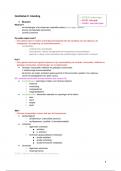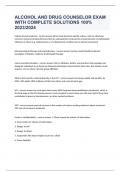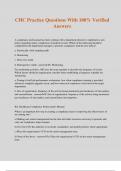The Law of Contract: Study Unit 9
Private Law 372: 2021
Table of Contents
9 LEGALITY....................................................................................................................... 2
9.1 INTRODUCTION.................................................................................................................................... 2
9.2 STATUTORY ILLEGALITY......................................................................................................................... 3
9.3 COMMON-LAW ILLEGALITY...................................................................................................................... 5
9.4 SPECIFIC EXAMPLES OF ILLEGALITY........................................................................................................... 9
9.5 CONSEQUENCES OF ILLEGALITY............................................................................................................. 32
9.5.1 Introduction............................................................................................................................ 32
9.5.2 Valid but unenforceable.......................................................................................................... 33
9.5.3 Void & unenforceable............................................................................................................. 34
1
,9 LEGALITY
9.1 Introduction
Definition of illegality:
o If a term in the contract itself, or the enforcement of the term, is either against
statute (statutory illegality) or against the common law (against public policy/
interest)
Distinguish illegality relating to various issues/ matters:
1 Conclusion of contract
Sometimes it is said that ‘you may not conclude a contract for the
following…’ for example according to the lockdown regulations, depending
on the level of the lockdown, there are regulations that say, ‘you may not
conclude a contract for the sale of tobacco’.
The conclusion of the contract itself is prohibited.
2 Manner of performance [?]
Sometimes distinction is made between that form of illegality & illegality
relating to the manner of performance of the contract.
Textbook mentions an example of a contract which for example, the
manner of performance is to commit a crime such as a murder or delict.
Not sure if that is something which is so easily distinguishable from
the 1st category. Why cannot we say that the content of the contract
itself, is such that its conclusion is illegal?
For eg. if a tenant, according to the contract, is required to effect certain
repairs. This is a valid obligation in terms of the law. But the tenant now
goes & builds something contrary to some regulation – does not get
necessary permission. What is the effect of that if the tenant just performs
the contract in an illegal manner? Surely that should not affect the validity
of the obligation to build, itself? Unless, what is meant here is the idea
that if a certain contractual clause has a tendency to conflict, then maybe
one could say that it is illegal.
I.e., sometimes you may have an obligation which is broadly
worded. It might get implemented in a way that is illegal, but it
doesn’t have to be implemented in a way that is illegal.
So, our courts then look at whether there is a tendency to conflict/
tendency to violate a provision.
SA Bank of Athens v Van Zyl 2005 5 SA 93 (SCA)
Tendency to conflict?
*Will return to this case later
3 Purpose or object of a contract
Eg. I sell you an axe. Normally, selling an axe is perfectly fine but if I sell it
to you with the idea that you & I want you to then go commit some crime
with it, then the purpose of the contract is illegal.
The mere unilateral purpose from one party cannot really constitute this
type of illegal purpose.
Kennedy v Steenkamp (not prescribed) refers to this situation where both
parties share this illegal purpose. Case had to do with a document –
promissory note – an undertaking to pay a certain amount, the purpose of
the note was to promote an illegal diamond sale.
Burden of proof of illegality?
2
, o General POD: the one who relies on the illegality, is the one who bears the
burden of proof.
I.e., a party who wishes to rely on illegality should plead it & the onus to
prove it also rests on her/ him.
o Mero motu = a court may also, if it sees an instance illegality, decide to raise this
issue.
9.2 Statutory illegality
Determining statutory illegality, firstly need to interpret the relevant statutory provision
itself (analyse the relevant legislative provision), secondly you proceed to the relevant
contract & determine its ambit & scope
o Simple example: if the regulation says you are not allowed to sell tobacco & the
parties concluded a contract for the sale thereof, then we have a match.
o Linked to this is the issue of determining the ambit of the statute by then trying
to establish the intention of the legislature or the purpose of the legislation.
o What is required of us is to figure out what the purpose is but especially in terms
of the consequences!
Consequences of statutory illegality depend on intention of legislature
o How do we know what the consequence should be if a person transgresses one
of these provisions?
One could be that the contract is completely invalid/ void but that is not
necessarily the case. If you contravene a statute, it does not mean that
the statute requires that the contract itself must be invalid. It could be
that the idea is that you might just be liable for a penalty.
This is very NB in practice, because once you’re in trouble you want
to determine how to get out of trouble.
o List of factors that could be relevant in this regard:
(1) It could be expressly stated in the provision itself – is the provision
itself peremptory?
Is there an express & clear prohibition in the provision?
(2) Is there a penalty imposed by statute?
If a statute imposes a penalty, you could use it to interpret it for 2
totally different conclusions: (1) this is so bad, there is a penalty, it
must be void, or (2) there is a penalty, thus there is no need for
further punishment, leave the contract alone.
o I.e., whether or not there is a penalty, is not conclusive of
suggesting whether or not the contract should be void, or on
the other hand that the contract is valid & it’s just okay to
pay the penalty.
(3) Courts also look at the potential impact of finding invalidity
Could be various inconveniences/ improprieties resulting from
invalidity. So, the consequences of prohibiting something to the
extent that you make it invalid or interpreting the provisions to
result in invalidity, that could also be something that the courts
consider.
(4) Courts also look at whether you contravene revenue legislation
Could be that the purpose of the legislation could be served by
different ways other than by requiring the contract itself to be
invalid/ void.
3
, o Sometimes if you don’t meet certain requirements in terms of
statute that relate to taxes, for example, if you have to pay a
license & you don’t pay it, this doesn’t necessarily mean that
the contracts that are concluded without the license are
necessarily void. So, you don’t have to give effect to the
revenue legislation requiring a license, by invalidating all
those contracts.
So, you don’t have to give effect to the revenue legislation requiring
a license, by invalidating those contracts.
You could also impose an additional penalty
So, when dealing with revenue legislation & licenses that are not
obtained in time – it does not necessarily mean that the contract is
void because of this.
(5) Motive
Whether you deliberately/ intentionally violated the provision or if
you were unaware of this provision from the outset.
Transactions in fraudem legis
o Transaction that is, essentially, deliberately designed to conceal its nature.
o The parties in fraudem (fraud) deliberately make this ‘thing’ look different so that
it doesn’t fall in the ambit of specific legislation.
o When parties do this, the law considers what the real transaction is.
For eg. if you make it look like a sale, but it is actually a lease. Then the
court looks at legislation & whether it covers a lease, if it does, then you
are in the ambit of the legislation.
o On the other hand, whatever your shenanigans might have been, if you
ultimately ended up concluding a transaction that is actually outside the
legislation, then you didn’t contravene the legislation.
o This principle doesn’t mean that the courts will interpret the legislation more
broadly to “get at you” just because your motive was bad.
Either the transaction falls within the ambit of the Act, or it doesn’t
Examples of statutory illegality; various protectable interest (do not need to know
these)
o Almost impossible to provide all examples of statutory illegality
o Thus, we will simply state some broad headings of various examples:
Contracts involving dangerous substances or dangerous social activities –
Under the former, substances like liquor, narcotics, dangerous
weapons etc. could arise
Under the latter, things like gambling are frowned on to some
extent.
Legislation that deals with family/ the interests of children
Legislation dealing with surrogacy agreements etc.
Legislation that deals with the economy & preventing potentially harmful
economic activity, or trying to protect the economy or the interests of the
state, to regulate certain types of behaviour.
This would be like trading in minerals
Subdivision of agricultural land
Provisions dealing with consumer protection like the CPA
Credit law – extension of credit to consumers
Legislation ultimately aims to protect certain interests – these examples could be
grouped around these protectable interests.
4














